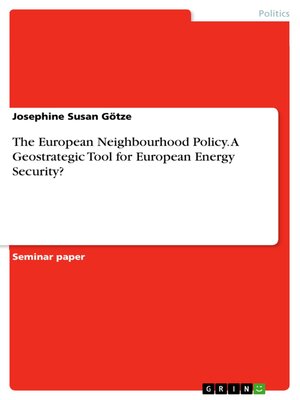The European Neighbourhood Policy. a Geostrategic Tool for European Energy Security?
ebook
By Josephine Susan Götze

Sign up to save your library
With an OverDrive account, you can save your favorite libraries for at-a-glance information about availability. Find out more about OverDrive accounts.
Find this title in Libby, the library reading app by OverDrive.



Search for a digital library with this title
Title found at these libraries:
| Library Name | Distance |
|---|---|
| Loading... |
Seminar paper from the year 2017 in the subject Politics - Topic: German Foreign Policy, grade: 1,3, University of Cologne, course: Aktive Außen- und Sicherheitspolitik: Geopolitik, Geostrategie, Change Management und Völkerrecht als Mittel zur Politikgestaltung, language: English, abstract: The European Union (EU) has an increasing demand for energy, which is the basis for its economy and the prosperity of its citizens. Given the fact that the Union itself does not have the necessary resources at its disposal, it is dependent on other resource exporting countries – especially Russia. To become more independent from those countries, the EU follows a strategy of diversification of energy supplies and market liberalisation. In this context, the European Neighbourhood Policy (ENP), bringing together the EU and 16 of its Eastern and Southern neighbouring states, plays a significant role. But the rapprochement between the EU and its neighbours is problematic regarding relations with Russia, which see its interests in its traditional zone of influence threatened. Given the high dependence of European (and ENP) states on Russian gas, Russia was traditionally able to use energy deliveries (or rather their non-delivery) as a geostrategic tool to push through its interests. With the ENP, which enables the coordination of deliveries and pipeline projects with energy transit countries, the EU has developed a geostrategic tool to potentially reduce the Russian influence on deliveries. Against the background of relations between the EU and Russia being characterised by non-static mutual interdependence, (geopolitical) strategies can be used to change the power relations between states in favour of one actor or another. In this context, the aim of this paper is first, to elaborate on the geostrategic functioning of the ENP and second, to evaluate the value of the ENP for European Energy Security focusing on the Eastern Partnership and the resulting changes in the energy relations between the EU, its neighbours and Russia, to finally be able to give an answer to the question "To what extent does the ENP serve the EU as a geostrategic instrument to improve its energy security?". In the analysis, the European as well as the Russian standpoint will be considered to be able to reveal strengths and weaknesses of the ENP-strategy.







